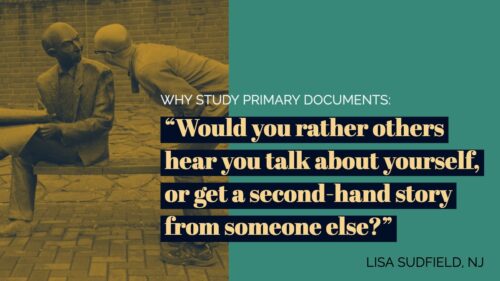Meet Our Teachers
Lisa Sudfield

TAH Seminars Remind Teachers Why They Teach
High school social studies teachers say that Teaching American History (TAH) seminars renew their enthusiasm for a job full of challenges. Teachers must maintain focus as announcements blare through loudspeakers and as students are pulled from class for guidance counseling, sporting events and school photos. They push through curriculum, preparing for standardized tests, while planning upcoming lessons and recording students’ progress. TAH seminars give teachers uninterrupted time to steep themselves in history, government, and the great ideas they entered teaching to share.
Lisa Sudfield teaches at Piscataway High School in New Jersey. The campus of Rutgers University—Sudfield’s alma mater—lies partly in Piscataway, and the city is rich in American historical sites. Sudfield attends teacher outreach programs at Rutgers and meets with local preservationists to plan educational programs for students. TAH programs, however, give Sudfield help that other local resources, even those at Rutgers, do not. Centered on primary documents of American history, these seminars help Sudfield “work through my thoughts” on past American statesmen through discussion with fellow teachers.
The Insights Generated by Conversation
Sudfield attended a TAH weekend seminar at Montpelier, James Madison’s Virginia estate. As a preservationist, she was eager to tour Madison’s home; but she learned far more through discussing Madison’s writing. Noting the creative and thoughtful compromises Madison made in his work on the Constitution, Sudfield wondered, “Who today is reminding Congress and the President of Madison’s example, so that they can learn how to work together to govern?”
Sudfield praised TAH Professor Chris Burkett, who facilitated the Madison weekend. “If you asked a question, he might say, ‘I never thought about that before!’ It’s inspiring to watch a very learned person having a new idea.”
History unfolds its truths as we examine the evidence, Sudfield says; it cannot be encapsulated in textbooks. Students find this “difficult to understand, because they look for right and wrong answers. I have to explain that instead of those firm answers, there is support” in the historical document “for the interpretation you’re making.” TAH professors model this teaching approach, Sudfield says. “A good facilitator gives you a question to drive the conversation and then steps back. That allows for rich dialogue.”
The teachers who attend TAH seminars “come in already having made notes on the reading, fully there and ready to talk about history.” In other primary document-based programs, “you don’t get the reading ahead of time, so you know you’re going to a lecture.”
Allowing Earlier Americans to Explain Themselves
Sudfield has always taught primary documents in her advanced placement US history classes. TAH seminars inspired her to use primary documents more often in her hybrid US history and civil law course for sophomores. She uses the online TAH collection, 50 Core American Documents, edited by Professor Burkett. Assigning the often difficult texts, she challenges students, “Would you rather others hear you talk about yourself, or get a second-hand story from someone else?” To encourage dialogue, Sudfield arranges her classroom in a large rectangle, all desks facing into the center. Students learn “to argue points from the perspective of the historical period” rather than from a 21st-century perspective. “We have something to learn from the past,” Sudfield says.
Sudfield’s teaching assignment includes weekend duty as stage-manager for the high school drama program. But she makes time for TAH seminars when she can. “You get to meet teachers from around the country, tapping their knowledge and skills. Our profession is full of creative, caring people who really take their jobs seriously.” Sudfield’s testimony should give all of us hope for America’s future.

